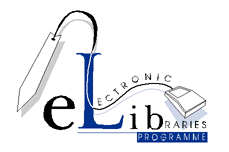Electronic Seminars in History
- Project web site
-
Not available
- Programme area
-
Electronic Journals
- Contact details
-
Dr Steven R B Smith, Project Director,
c/o Institute of Historical Research University of London Malet Street London WC1E 7HU
Phone: 0171 436 2183 Fax: 0171 438 2183
Email: s.smith@sas.ac.ukMs Alene Wilton, System Manager,
c/o Institute of Historical Research University of London Malet Street London WC1E 7HU
Phone: 0171 636 0272 Fax: 0171 438 2183
Email: a.wilton@sas.ac.uk
Project description
as of January 4th 1996
Introduction
Electronic Seminars in History takes advantage of the electronic media's ability to make research instantly available to all without creating additional demands on space, or the constraint imposed by geographical location.The project is such that it provides a personal incentive for historians to become involved with email and computer-based systems. This is important as many departments are not connected to a server with email, let alone have machines which act as Internet nodes and run web browsers, such as Netscape. This project is aimed at the facilities that all history departments have or soon will have, not what they might have in a few years' time.
Electronic Seminars in History is flexible to change and will grow in response to feedback from the many universities involved.
Description
DISTRIBUTIONMaterial from Electronic Seminars in History is delivered to the individual's email account [software: Majordomo] according to their specified research interest.
ARCHIVES
The Electronic Seminars in History archives will allow all students of history to browse rapidly and systematically across a full variety of historical fields in which research is carried out in the UK. Electronic Seminars in History will be accessible from the information server, IHR-INFO which is already established.
USER POPULATION
Fifty-eight historians have already agreed to act as contacts for their departments or institutions and many more are in the process of becoming involved or are held back for technical reasons. Contributor access (access to send in material) to the system will be limited to those with a minimum of two years' postgraduate research experience and, for students, will be subject to the consent of their departments.
PERFORMANCE INDICATORS
Overall Usage: Over 90% of all HEI history departments
Minimum number of seminar fields: 50
Number of subscribers per seminar field: average of 20
Number of seminar papers placed upon the system: minimum of a paper a month per seminar field.
Satisfaction level of users: maintain at good to excellent, being points 4 and 5 on a five point scale as indicated from yearly electronic questionnaires.
Partners
The Institute of Historical Research is the national centre for historical research, and is the largest single UK centre for research seminars in history. In 1993-94, IHR held 486 seminars, with a total of nearly 10,000 attendances. A calculation based upon Teachers of History, Theses in Progress and Theses Completed puts the market of possible UK users of Electronic Seminars in History around 10,000 researchers.IHR hopes to include all departments of history in the UK and feedback from all parties contacted suggests that interest in this type of project is at a peak.
Schedule
At the end of the first six month period all the universities involved would be presented with a report which would include: the level of use of Electronic Seminars in History; the character of that use; and a precis of feedback received over the first six month period. During the second six month period developments would be implemented and adjustments made to the system.At the end of the second six month period a second report would be presented which would include the results of an electronic questionnaire issued at the beginning of the twelfth month. During the third six month period, during which most university history departments would be involved, advice would continue, a record of feedback kept, and developments implemented. At the end of the third six month period a report on Electronic Seminars in History use, character and feedback would be presented to all universities involved.
During the fourth six month period preparations would be made for handing the project over entirely to IHR staff. At the end of the fourth six month period a final report would be presented based on records and the results of an electronic questionnaire which would include questions on the level of charges to be made for the project henceforward.

